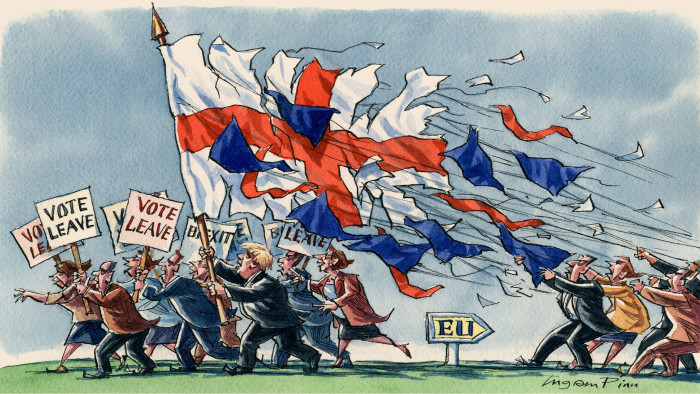Brexit would tear Britain apart

Roula Khalaf, Editor of the FT, selects her favourite stories in this weekly newsletter.
There are two unions whose fortunes rest on the outcome of the June 23 referendum. If Britain chooses Brexit the consequences will be serious, though probably not terminal, for the 27 remaining members of Europe’s union. Germany and France are doubtless thinking hard about how best to underscore the cohesion of the rest of the EU. The second union — that of the nations of the United Kingdom — would be at greater risk from the centrifugal forces of a Leave vote.
The Outs have become the voice of strident English nationalism. The Conservative-led Leave campaign has all but abandoned the considered case for quitting the EU to throw in its lot with the populists of Nigel Farage’s UK Independence party. The shared message is anti-immigrant, anti-establishment, anti-intellectual and anti-just about anything you care to think of. Call it project anger.
Whatever the overall outcome, the nations and regions of the UK will not vote as one. A glance at the geography of British opinion suggests that three areas are all but certain to back maintaining the present relationship with Europe. London, Northern Ireland and Scotland all show clear pro-European majorities. Wales is harder to call.
London’s continental tilt is one of self-description. The capital has thrived as a global city, welcoming workers and migrants from across Europe and the world. London is France’s sixth-largest city, welcoming up to 300,000 French citizens. It offers a second — and sometimes a first — home to Italians, Poles, Spanish, Portuguese and many others, as well as to those arriving from more distant shores.
The city is comfortable in its diversity. The recent mayoral election saw the Conservative candidate Zac Goldsmith wage a shamefully Islamophobic campaign. Londoners turned out in record numbers to back Sadiq Khan, a British-born Muslim.
The capital has none of the self-consciously starched Englishness of the affluent, Brexit-leaning home counties. And though London includes pockets of considerable poverty, they lack the ethnic grievance apparent in the poor towns dotted along southern England’s eastern coast. My guess is that, confronted with the choice, most Londoners would apply visa controls to visitors from its native (mostly white) hinterlands before shutting off the flow of Polish doctors and Indian engineers.
Northern Ireland, where recent polls have pointed towards a big majority in favour of Remain, has different concerns. As for many things, Europe is viewed through at least two sets of lenses. Broadly speaking, the Catholic, mainly nationalist community is overwhelmingly European in its outlook. Protestant unionists are more evenly divided, with polls suggesting a bias towards Brexit. Overall, the province will vote to remain.
A UK-wide vote to sunder ties with Brussels would destabilise a part of the UK still bearing the scars of sectarian violence. Shared membership of the EU was integral to the success of the British and Irish governments in coaxing nationalists and unionists towards peace. Rising prosperity in the north has been built on an open border with the Republic and, of course, on generous grants and investment incentives from Brussels.
Brexit would transform an invisible frontier between Northern Ireland and the Republic into the external border between the UK and the EU. The UK’s departure from the single market and the imposition of immigration curbs would require the return of cross-border checks on people and trade. And should Scotland press again for independence, how long would it be before the English began to see Northern Ireland as an unwelcome economic burden? This is the sort of reasoning that has persuaded the government of Gibraltar to throw its weight behind the pro-European side.
Euroscepticism has never really taken root in Scotland, perhaps because of its association with the English nationalists on the Tory right. Mr Farage’s Ukip has made only limited headway. So, like London and Northern Ireland, Scotland seems assured of a sizeable pro-European majority. A UK-wide Brexit vote that wrenched Scotland out of the EU against its will would be a gift to pro-independence nationalists.
After failing to win an independence vote in 2014, the governing Scottish National party suffered a setback in last month’s elections to the Edinburgh parliament. It lost its overall majority and with it the authority to call another independence referendum. But Britain’s departure from Europe would re-energise the argument. The prospect of a Scotland shackled to an England that had thrown up barricades against the continent would make erstwhile unionists think again.
So they should. The case for the UK union is much the same as that for UK membership of the EU: by pooling sovereignty, nations increase their capacity to act effectively. If England left the EU it would make eminent sense for Scotland to swap one union for another.
It is too soon to speak of an independent London, though looking beyond Brexit it is not hard to see the capital demanding much greater autonomy. What does seem clear is that a Leave vote would intensify the political fragmentation of the UK union. Without Europe, the Brits may decide, Britain looks a much less attractive proposition.
Comments